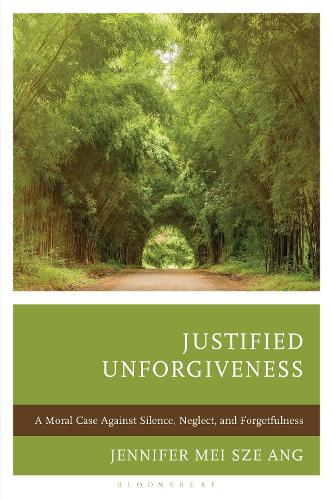
Justified Unforgiveness: A Moral Case Against Silence, Neglect, and Forgetfulness
(Hardback)
Publishing Details
Justified Unforgiveness: A Moral Case Against Silence, Neglect, and Forgetfulness
By (Author) Jennifer Mei Sze Ang
Bloomsbury Publishing PLC
Rowman & Littlefield Publishers
16th October 2025
United States
Classifications
Professional and Scholarly
Non Fiction
179.9
Physical Properties
Hardback
168
Width 152mm, Height 229mm
Description
Justified Unforgiveness: A Moral Case Against Silence, Neglect, and Forgetfulness corrects the overemphasis on the benefits of forgiveness and shows how unforgiveness is a morally appropriate and at times morally necessary response towards unremorseful and unrepentant wrongdoers, grave wrongs brought about by absolute evil, and situations where justice is not served. In advancing an argument for unforgiveness, Jennifer M.S. Ang deals with three dimensions of forgiveness forgiveness as the letting go of resentment, forgiveness as reparation of damaged moral relations with the community, and forgiveness as letting the past remain in the past. Ang examines these arguments using cases of mass atrocities that are not often discussed in the forgiveness literature, such as the Nanking massacre, the Japanese military comfort women system, and the Khmer Rouge genocide, to reflect on the paradigm example of the Holocaust as absolute evil. These discussions also clarify the relationship between time, forgiveness, and justice how time can affect the willingness to forgive; how the carrying out of justice over time remains vulnerable to politicization; and how memory of mass atrocities enables victims to let go without forgiving.
Reviews
Justified Unforgiveness presents a bold account that challenges and expands the philosophical examination of forgiveness. Focusing on examples of radical evil from several underappreciated historical case studies, Ang argues that justified unforgiveness provides a moral defense of victims and their memories, which then promotes both personal and communal dignity and healing. By clearly examining the relationship between time, apology, truth, forgiveness, and justice, Ang shows why protecting victims requires the letting go of resentment without forgiving. Angs work will expand the readers understanding of forgiveness, clarify the roles and limits of legal justice vs. the justice of collective memory, and invite the inclusion of a more prominent place for justified unforgiveness within the philosophy of forgiveness. * Court D Lewis, Pellissippi State Community College, USA *
Whether you support showing wrongdoers unconditional forgiveness or not, Justified Unforgiveness is essential reading for understanding the case for moral resentment. Jennifer Ang argues that unforgiveness is not necessarily vindictive and is actually morally appropriate when wrongdoers are unrepentant or when the gravity of evil is so great that forgiveness and reconciliation are impossible. To support her argument, Ang takes us on a gripping tour through the worst crimes in history Nazi atrocities, the Khmer Rouge genocide, and the Nanking massacre. * Gregory L. Bock, The University of Texas at Tyler, USA *
Author Bio
Jennifer M.S. Ang is associate professor of philosophy at the Singapore University of Social Sciences.
